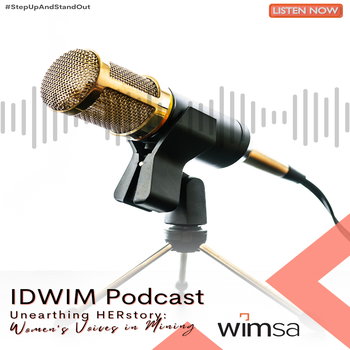
#027 Make Mentoring Matter | Busting myths and misconceptions about mentoring
Loading player...
Briony Liber, mentoring Lead for the WIMSA Mentoring Programme, chats with Mbali Milanzi (Tshepa Basadi Group | MD); Melody Mmesetse (WIMSA 2022 mentee and MEng Geotechnical Engineering student); Ndamulelo Mutshinya (WIMSA 2022 mentee and Anglo American Platinum | Section Ventilation Officer) about myths that seem to get in the way of mentoring relationships.
Some of the myths that get debunked in this conversation include:
- people are too busy to be mentors (it's not true - sometimes you just need to ask);
- you need to be impressive before someone will be willing to mentor you (it's not true - in fact, most people start their journey towards being impressive by asking someone to mentor them);
- mentors need to know everything and be able to mentor you on everything you want to know (it's not true - there are no unicorn mentors!);
- mentoring needs to be formal and it needs to take the form of a meeting (it's not true - mentoring can take whatever form you and your mentor decide will work for you);
- mentors are hard to find (it's not true - sometimes we just aren't looking at everyone in our networks as potential mentors).
One of the key points made in the conversation is that sometimes labelling someone as your mentor from the start, can add a lot of pressure to the relationship. Probably the most important conclusion in this conversation is that perhaps by dropping the label of "mentor", a more organic relationship can develop that serves the needs of a mentee and eventually grows into a relationship that can be labelled as one of mentoring.
Some of the myths that get debunked in this conversation include:
- people are too busy to be mentors (it's not true - sometimes you just need to ask);
- you need to be impressive before someone will be willing to mentor you (it's not true - in fact, most people start their journey towards being impressive by asking someone to mentor them);
- mentors need to know everything and be able to mentor you on everything you want to know (it's not true - there are no unicorn mentors!);
- mentoring needs to be formal and it needs to take the form of a meeting (it's not true - mentoring can take whatever form you and your mentor decide will work for you);
- mentors are hard to find (it's not true - sometimes we just aren't looking at everyone in our networks as potential mentors).
One of the key points made in the conversation is that sometimes labelling someone as your mentor from the start, can add a lot of pressure to the relationship. Probably the most important conclusion in this conversation is that perhaps by dropping the label of "mentor", a more organic relationship can develop that serves the needs of a mentee and eventually grows into a relationship that can be labelled as one of mentoring.



